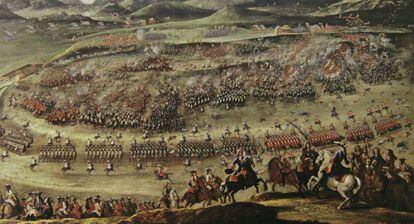‘Botifler’: the pro-independence movement’s favorite insult
Catalan secessionists have brought back into use a term that was originally employed in the 18th century against the Bourbon army


Botifler is used as an insult or nickname, but it is an interesting word, at least from the philological point of view. The etymology of this Catalan term that has reemerged with unusual force during the so-called secessionist “process” is not clear. It was used as a derogatory term for the followers of the Bourbon royal family, and now pro-separatists are using it against Spaniards opposed to Catalan independence.
There are two main theories about its origin: one argues that it is a creation of French-influenced speech and another points to native speakers. The first goes back to the French phrase beauté fleur (the beautiful flower), alluding to the coat of arms for the House of Bourbon. From beauté fleur to botifler there is only one phonetic step. The term could also come from the adaptation of the surname of Marshal Louis François de Boufflers (1644-1711), according to some texts from the beginning of the 18th century.
It always has a pejorative meaning and its use goes back to the War of Succession Emili Casanova, professor of Catalan philology
The second theory credits Catalan philology. The term could come from the Catalan phrase bot unflat, inflat, which compares a rich, fat person to the majority of the malnourished, poor population in the 17th and 18th centuries. “It could also mean a conservative person,” says Emili Casanova, professor of Catalan philology at the University of Valencia. Francesc de Borja Moll and Joan Coromines, other experts, point out that botifler shares its root, botir, with botiró, a word used to refer to Bourbon soldiers.
The term has been documented in Catalonia since the beginning of the 18th century. It has also been used in the Balearic island of Mallorca, and later in Valencia, a port city on the eastern coast, says Casanova. “It always has a pejorative meaning, and its use goes back to the War of Succession. In Catalonia, it reemerges with great force and refers back to the Renaixença,” he adds, referring to the cultural movement for Catalan literature and language during the mid-19th century.
There is no doubt of the insult’s significance against Felipe V supporters during the War of Succession (1701-1715), against the Austrians.
The “traitors”

Today there is some confusion in the use of botiflers, linked to the bitterness in the way pro-independence people use it. Some consider it to mean “traitor.” Historically, this use has been documented, but only referring to those in Catalonia who supported the Bourbons. It has been revived with secessionism as an insult, especially directed against politicians and intellectuals.
In the Valencia region the term is kept alive as a critical way of referring to those who represent Castilian centralism or those who reject their language and culture.
It also alludes to the battle of Almansa, when the Bourbon army severely defeated the Austrians on April 25, 1707, which led to the siege and fire of Xàtiva, a town in the eastern region of Valencia. To this day, Xàtiva displays a portrait of Felipe V upside down at the Casa de la Enseñanza museum.
English version by Debora Almeida.











































